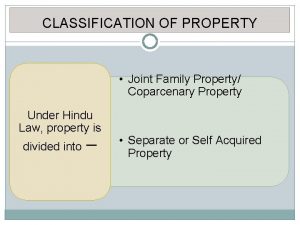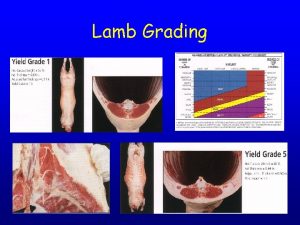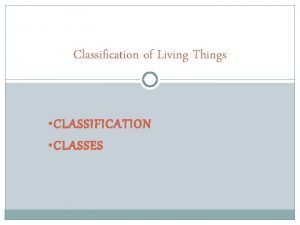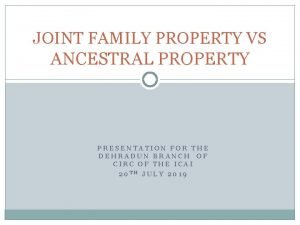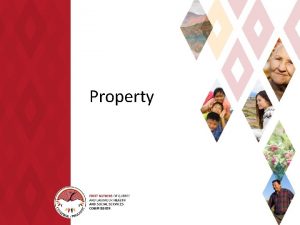CLASSIFICATION OF PROPERTY Joint Family Property Coparcenary Property











- Slides: 11

CLASSIFICATION OF PROPERTY • Joint Family Property/ Coparcenary Property Under Hindu Law, property is divided into – • Separate or Self Acquired Property

CLASSIFICATION OF PROPERTY • Sapratibandha Daya( Obstructed Heritage) Under Hindu Law, property is also divided into – • Apratibandha Daya (Unobstructed Heritage)

UNOBSTRUCTED HERITAGE �Property inherited by a Hindu Male from a direct male ancestors within the 3 generations �Property inherited from father, father’s father (grandfather) and father’s father ( great- grandfather) �Devolves by Survivorship

OBSTRUCTED HERITAGE �Property inherited by a Hindu Male from any other relation is called the obstructed heritage �Property inherited from uncle, nephew, brother etc. �Devolves by inheritance

ANCESTRAL PROPERTY Property inherited from father, father’s father or father’s father (under Section 8 – Hindu Succession Act) Property inherited from maternal grand-father Property inherited from any other relation

PROPERTY INHERITED FROM FATHER, FATHER’S FATHER �Property inherited by a Hindu Male from a direct male ancestors within the 3 generations �Property inherited from father, grandfather and great- grandfather � Property devolves to another by Survivorship

Section 8 – Hindu Succession Act �Under old Hindu Law, when a son inherits property from his father , he will take it as a joint family property �Mr. A inherits the property from his father. Mr. A has three sons – B, C and D. � Now, the property in the hands of A, B, C and D will be joint family property

� Section 8 of Hindu Succession Act provides that – When a Hindu inherits the [property from the father , he takes it as a separate property and not as joint family property vis-a vis his sons � Mr. A inherits the property from his father. Mr. A has three sons – B, C and D. � Now, acc to Sec 8 - The property in the hands of A, B, C and D will be separate property and not as joint family property

SOME EXAMPLES OF ANCESTRAL OR SELF ACQUIRED PROPERTY � Property inherited from a paternal ancestor is ancestral property. � Property inherited from maternal grand father is not ancestral property , but it is his separate property. � Property inherited from females will be his separate property. � Property obtained by gift or will from a paternal ancestor - depends on facts of case � Additions - property purchased or acquired out of the income or with the assistance of ancestral property would be ancestral property. � Property purchased out of sale proceeds of ancestral property is also ancestral property.

PROPERTY THROWN INTO COMMON STOCK – DOCTRINE OF BLENDING when a coparcener mixes his separate property with the joint family property, and deals with his separate property in a manner that he leaves no doubts that he wants to treat it as part of the joint family property, such property becomes a joint family property. - This is known as ‘throwing in to the common stock’ - If he mixes his property with the joint family property it is known as blending.

SEPARATE PROPERTY �All property other than joint family or coparcenary property is separate property. � Even if a hindu is a member of a joint family, he may possess separate property. �The term self-acquired indicates that the property has been acquired by a coparcener by his own means without assistance of family funds.
